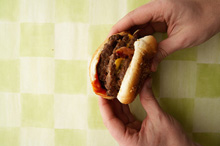Should the U.S. Impose a Fat Tax? Let Us Know What YOU Think!
by www.SixWise.com
In 2007 the Norwegian government began seriously weighing whether to increase their tax on high-sugar, high-fat foods. This topic drew one of our largest reader responses as Sixwise.com readers shared their opinions on this important issue.
|

Experts say a one-penny-per-ounce national soda tax could raise up to $200 billion in 10 years.
|
Now, however, the United States is considering following suit and launching a tax on soda to help fight fat. The tax is meant to work in two ways:
- Help Americans lose weight by discouraging them from buying soda (the CDC pointed out that the average American consumes about 250 more calories a day than they did 20-30 years ago, and 120 of those come from soda and other sugary drinks)
- Raise revenues to help offset costs of obesity-related illnesses, which currently cost the U.S. close to $150 billion a year
About 40 U.S. states currently do have a tax on soft drinks and junk food, but they are typically too low to make much of an impact on consumption.
The national fat tax suggestions so far have included a one-penny-per-ounce national tax on soda. Such a tax is estimated to raise $100 billion to $200 billion in 10 years while significantly reducing caloric intake from sugary beverages, according to Thomas Frieden, the head of the Centers for Disease Control and Prevention (CDC).
As reported by the Associated Press, obesity is clearly an ever-growing health problem in the United States, and Frieden believes price interventions are an effective way to make a difference.
His suggestion for a soda tax is based on his work as former health commissioner of New York, where he raised taxes significantly on cigarettes.
“We reduced adult smoking by 25 percent and teen smoking by 50 percent in six years. About half of that reduction was the result of taxation," Frieden told the Associated Press.
Fat Taxes: A Bit of Background
The idea of a fat tax first gained widespread attention in 1994 when Yale University psychology professor Kelly D. Brownell, author of Food Fight, proposed two different fat tax options. The first was a tax of 7 percent to 10 percent that would be added to processed foods in order to subsidize healthier options. His other proposal was a smaller tax that would help to fund long-term public health nutrition programs.
According to Brownell, the implications of such a tax could be monumental. Adding just one penny to the cost of soft drinks nationwide would generate close to $1.5 billion a year.
Several states have, in fact, already imposed fat taxes. Arkansas, Tennessee, Virginia and Washington imposed taxes on soft drinks, while California, Maine and Maryland have tried out other fat taxes. Other states have considered banning junk food advertisements targeting children, and removing soda and junk food from schools is an ongoing issue.
Many of the states that implemented fat taxes have since had them repealed, and experts point to several problems with how fat taxes are currently configured. First off, the money gained from them has often been used to cover budget deficits, rather than to help fund obesity-prevention programs or subsidize healthy foods.
Others argue that the taxes are not fair to low-income families who must spend the majority of their income on food. Still others point out that it's difficult to pinpoint which foods should be taxed and which should not. So far everything from soft drinks and fast food, to healthier, albeit high-fat items like cheddar cheese and whole milk, have been suggested as suitable for a fat tax.
Industry members also believe that fat taxes are uncalled for, saying they unfairly target soft drinks, candies and other foods as the root cause of obesity, when overall poor eating habits and a lack of exercise are to blame.
Please Share Your Opinion With Us!
There’s no doubt that many Americans are struggling with weight gain. But whether or not a fat tax is the answer remains to be seen.
Clearly it doesn’t address the root causes of the problem (here we’ve compiled 10 often overlooked, and simple, tips that can help you to lose weight at the source) but perhaps it could start a trend in the right direction.
On that note, we’d like to open up the discussion once again and find out what YOU think about this hot topic. Should a fat tax be implemented in the United States? If not, why not? If so, what types of food should be taxed and how much should the tax be?
|
Please Let Us Know What YOU Think!
Select answers will be published in the forthcoming issue of the SixWise.com e-newsletter!*
|
|
| *NOTE: Your answer, or an excerpt thereof, may be published in a forthcoming issue of the SixWise.com e-newsletter and on the website. By submitting your answer you authorize this. Please include your name and your city state (or country) location to be included in the publication of select answers! |
Stay tuned for Reader Responses revealed in next week’s SixWise.com "Be Safe, Live Long & Prosper" e-newsletter.
Also keep an eye out for next week’s articles on both the best existing weight loss diets and new healthy weight maintenance approaches. Find out how to feel good and become healthy so you won’t have to worry about a fat tax (even if they are put into place in the future)!
Recommended Reading
Why are Food Prices so High, Why is There a Global Food Shortage? The Facts
Can You “Catch” Obesity? Experts Weigh in on the Theory That Obesity is Contagious
Sources
Yahoo News July 30, 2009